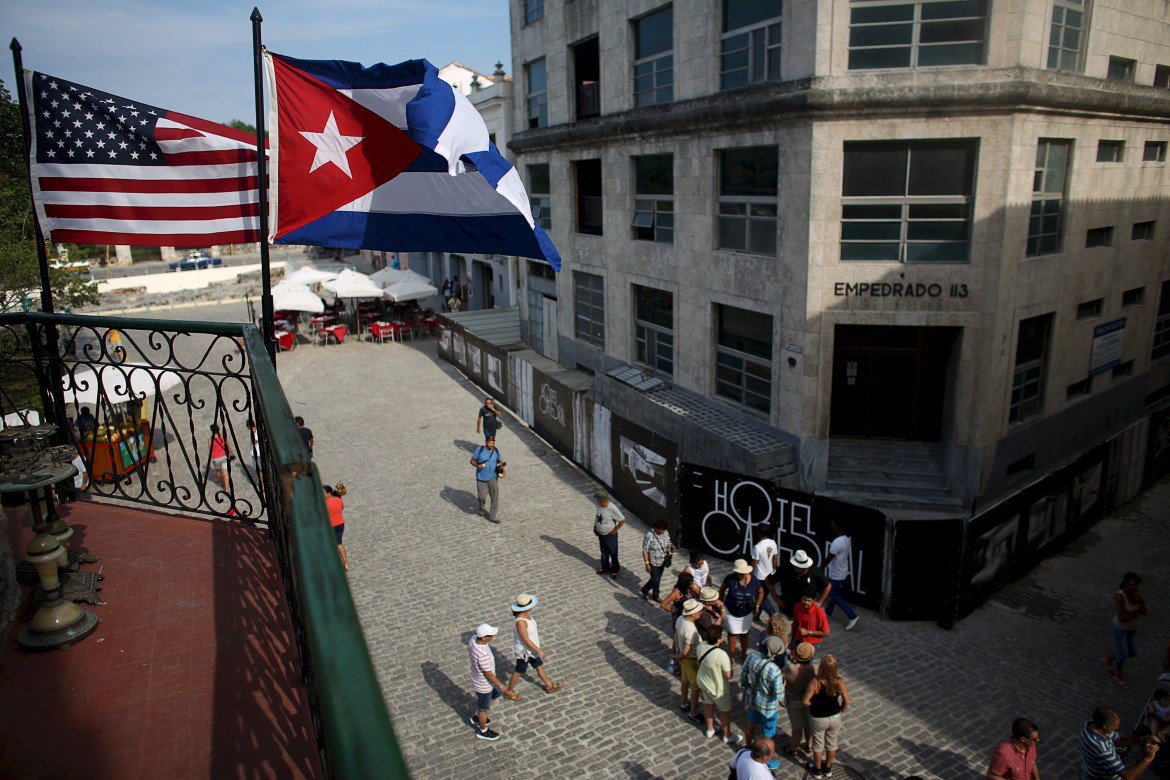Analysis
Obama in Cuba: Delicate state visit includes concessions on both sides
The meeting between Barack Obama and Raul Castro is an admission of the failure of the U.S. blockade. But the Cuban government is allowing Obama to address the Cuban people on live television.

The year was 1928 when U.S. President Calvin Coolidge landed in Havana aboard a battleship, the USS Texas, to participate in an international conference on an island practically still American occupation. In turn, the president was largely ignored, if not openly opposed, by the Cubans. That was the last time an American president had visited Cuba.
Barack Obama landed on the island, accompanied by his wife, Michelle, and daughters, Malia and Sasha on Sunday afternoon. His only armor was “The Beast,” the tank-like presidential limousine, which was transported to Havana in a C-17 Globemaster III. Residents lined the Malecon waiting to watch it pass, escorted by security services. “It will be like a movie or a show that we usually see on TV,” one of them, a university student, said.
History truly turned a page. For the first time, an American leader set foot in its Caribbean “backyard” without dictating conditions. He did not arrive as a colonial power — military, economic or cultural. On the contrary, Obama has admitted that the aggressively anti-Cuba policies adopted since Fidel Castro’s 1959 revolution were a failure.
Just a few years ago, nobody would have imagined this. In Havana, Obama will shake hands with a Castro without asking him to renounce his socialist convictions. Obama and President Raul Castro will discuss on an equal footing how to put a definitive end to a cold war that has lasted for more than 50 years and attempt to resolve their disagreement over Venezuela. Before meeting with Castro, he’ll lay a wreath at the memorial of independence leader José Martí at the highly symbolic Plaza de la Revolución, witness to many mass rallies and speeches of Fidel Castro.
“Obama will be received with a sense of hospitality and respect that characterizes Cubans,” Foreign Minister Bruno Rodríguez said Thursday. But he made it clear that the Cuban government would not “waive even one of its own principles,” and “will not negotiate in any way in relation to internal policy changes.”
In reality, the Cuban government clearly understands this is a historic step and has extended to Obama concessions never offered to other heads of state. Obama, who will be accompanied by a large delegation of congressmen, businessmen and representatives of the Cuban-American community, will not just meet private entrepreneurs. He’ll also meet separately with “a dozen” people representing dissident and opposition groups that the government considers enemies funded by foreign powers. Recently the government has come down hard on them, with more than 1,500 arrests of human rights defenders reported so far this year.
But Obama will deliver his strongest message directly to the Cuban people during a speech at the Gran Teatro de La Habana before an audience of 1,000 people, some of them invited by the United States. This is quite unusual. The speech will be broadcast live on national television, so that “everyone can form their own opinion on what he will say,” Rodríguez said.
Obama’s adviser on Cuban issues, Ben Rhodes, said “the president will address the issue of human rights and civil liberties.” Distancing itself from the regime change policy of past administrations, the president will say “very clearly that it is for the Cuban people” to push toward greater democracy in the country and that the United States, for its part, would work to improve the lives of Cubans.
“If they really want to help the Cuban people to improve, then finally put an end to the embargo,” Rodríguez replied laconically.
For both Obama and for the Cuban government, this is a delicate mission politically. Obama began his visit on tiptoe, with a walk through historical Havana and a meeting with the Catholic cardinal Jaime Ortega, who played a key role in secret negotiations, supported by Pope Francis, that led to the countries’ diplomatic breakthrough.
Monday morning the real agenda will begin, starting with meetings at the Palacio de la Revolución. Later, Raul Castro will host a state dinner with the First Family. The White House stressed that there will be no meeting with Fidel Castro, whose declining health led him to cede the presidency to his brother in 2008.
In the afternoon, the U.S. delegation will meet with cooperative leaders and Cuban entrepreneurs, including those in the private sector, in hopes that the U.S. could help develop a middle class and, eventually, they hope, political reforms. Apart from a future role as a stabilizing force in Latin America, Cuba is also an investment crossroads: Already the island is being flooded with Brazilian, Chinese, European and American capital. Some even imagine the island as a future hub of diplomacy and trade.
Obama will meet with the dissidents on Tuesday and end the visit with a baseball game between a Cuban team and a Major League team, the Tampa Bay Rays.
Originally published at http://ilmanifesto.info/obama-a-cuba-a-piedi-nudi-nel-cortile-di-casa/ on 2016-03-20
